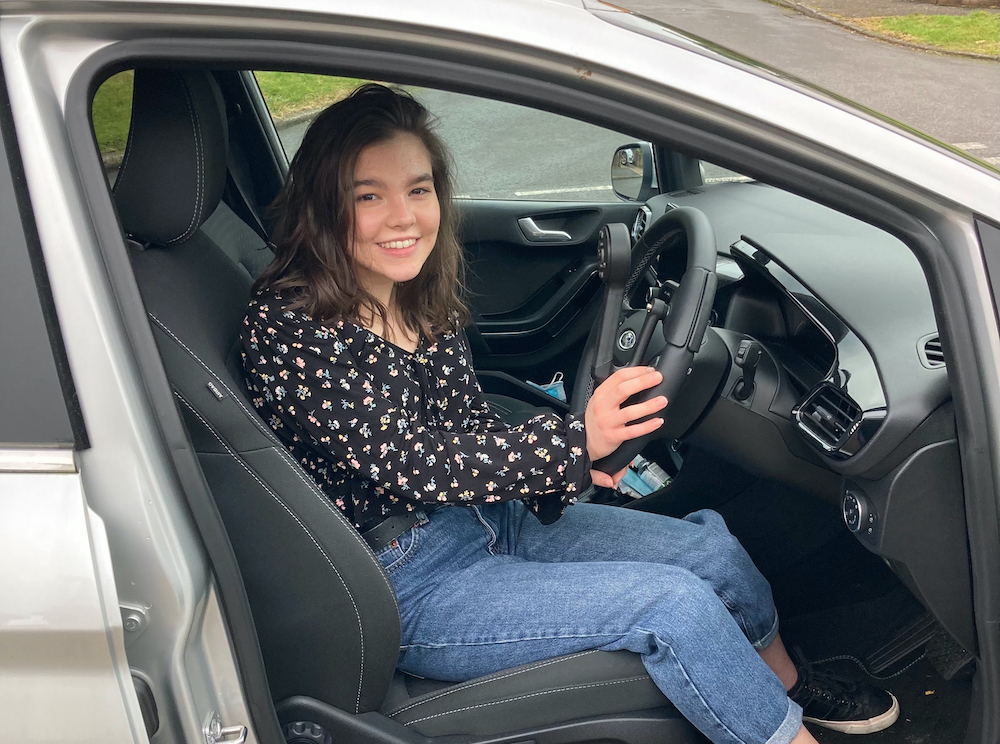
Emily Else, 19 from Swansea an A-level student with Cerebral Palsy, has been able to apply for university thanks to her ability to drive independently through support from the South Wales Driving Mobility Centre.
Emily first contacted the South Wales Mobility & Driving Assessment Service in 2018. This centre is based at the Rookwood Hospital in Cardiff and is part of the wider Driving Mobility network. Supported by the Department for Transport, Driving Mobility is a national charity which oversees 21 centres which provide clinically-led ‘fitness to drive’ and mobility equipment assessments so people with restricted mobility can gain or maintain independence. Service users self-refer, such as Emily, or are signposted to Driving Mobility from the DVLA, Motability, Police and healthcare professionals.
Each centre provides professional recommendations on adapted driving and wheelchair accessible vehicles through the knowledge of specialist Approved Driving Instructors (ADIs) and Occupational Therapists. Emily first discovered Driving Mobility on the Motability website whilst researching how to drive with a disability. At the time she was 16 and wanted to apply for her provisional driving licence; however due to her restricted mobility, Emily knew she would need an adapted car to start driving lessons. She contacted the South Wales centre for an assessment of her needs and an appointment was organised.
From the beginning Emily was impressed with the support she received from Driving Mobility: “Upon arrival at the centre everyone was warm and welcoming; they instantly made me feel relaxed. They spent time talking and listening to me about my condition and how it affected my lifestyle. I was then assessed on their indoor driving simulator to check my reaction times and eyesight; no problems there. After that I got to drive a car for the first time in the car park – quite nerve-racking, but the staff kept me calm! They had already set up an automatic car with something called a lollipop control stick which attaches to the steering wheel. This steering knob allowed me to steer the car with one hand and access secondary controls via buttons – wipers, indicators and lights. The only other adaptation I needed to suit my requirements was an easy release hand brake.”
“I then knew the type of adapted car I needed for driving lessons and they also put me in touch with a recommended Driving Instructor who had specialist experience of teaching drivers with disability. I was all set to go.”
Emily started her driving lessons on the day of her 17th birthday and went on to pass her test first time after 40 hours of tuition. She was absolutely delighted with her achievement and was so thankful to her ADI, Dave Broadhurst, for all his expert support. As she was learning to drive, she applied for a Motability vehicle with adaptations recommended by Driving Mobility. Emily adds: “My parents already had a Motability car, so I knew how good the scheme was for getting you on the road. Motability organised the new car and its adaptation at a local vehicle convertor based in Llanelli. I was able to take delivery of my new car only four weeks after passing my test which was so exciting. I suddenly had independence which was amazing, especially for getting to college and back. That was until the pandemic and everything got locked down. However, I know as we get back to normal my car is going to be invaluable for future education and work.”
Emily is currently completing her A-levels and has received conditional offers to study Occupational Therapy at Cardiff and Bristol Universities. Without the ability drive on her own she would never have been able to go to University, especially to study her chosen degree, as she concludes: “Studying Occupational Therapy, working on placement and then becoming a qualified OT involves visiting a lot of patients in the community. I needed to be able to drive not only to study, but to ultimately get a job. It’s been such an odd 12 months with A-level exams being scrapped but I’m hopeful I will still get into Uni with my assessed grades. Being an OT is my dream job as I’ve had experience from the other side as a client, so I totally appreciate the real difference their work makes. Being able to drive has made my dream job possible – a role that I believe is now more vital than ever before.”
#MyDrivingMobility
